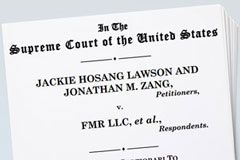Do You Need a Sarbanes-Oxley Whistleblower Lawyer?

Do you face wrongful termination because you reported corporate fraud or wrongdoing?
- Has your boss retaliated against you after you uncovered illegal or unethical conduct?
- Is your career on the line because you did the right thing and spoke out?
The Sarbanes-Oxley Act (SOX) is a federal law that forbids retaliation against whistleblowers who have some connection to publicly traded companies, including connections to a company’s subsidiaries, contractors, or employees. SOX protects the reporting of several types of fraud — not necessarily by the company itself — and provides damages for any illegal harm suffered by a good-faith whistleblower. If you were fired illegally, SOX may help you to get your job back.
The Sarbanes Oxley attorneys at The Employment Law Group® law firm are experienced in representing employees in SOX proceedings, both before the U.S. Department of Labor (DOL) — which enforces the law’s retaliation provisions — and in federal court. Several of our cases have broken new legal ground, helping to establish SOX as a pillar of workplace protection. We are based in Washington, D.C., but we take cases nationwide.
Representing two pro-employee groups, our firm’s attorneys briefed the U.S. Supreme Court before its first-ever SOX whistleblower case, which lead to a historic broadening of the law’s protection. In other cases we have helped to establish that retaliation by private companies can violate SOX; that whistleblowers need not cite specific laws that are being broken in order to be protected; and SOX forbids retaliation even when whistleblowers report possible fraud at a company where they are not employed.
In another ground breaking case before the United States Court of Appeals for the Fourth Circuit, we affirmed the absolute right to a de novo review of SOX claims in federal court after a case has been pending before the DOL for 180 days without a final judgment.
More about our law firm
If you have suffered illegal retaliation under the Sarbanes Oxley act, you may be entitled to reinstatement in your job; back pay for lost wages; front pay for future lost wages; litigation costs and attorney fees; and other compensatory damages.
As with all legal claims, deadlines are crucial. Retaliation complaints under SOX must be filed with the DOL’s Occupational Safety and Health Administration within 180 days.
Frequently Asked Questions
What are SOX Whistleblower Protections
Under SOX, employers are strictly prohibited from retaliating against employees who report illegal or unethical conduct. Employees are also protected when making disclosures about shareholder fraud or violations of SEC rules and regulations. Examples of whistleblower activities that are protected under SOX include:
- Reporting an employer’s failure to disclose accurate financial statements to potential investors
- Reporting an employer’s improper entries on financial statements
- Exposing senior management’s alteration of delinquency reports
- Reporting an employer’s use of an unregistered broker to solicit investors in exchange for a commission
- Raising concerns about a supervisor’s practice of backdating letters of credit
- Committing other violations of the law and betraying the public trust
What sort of whistleblower retaliation is prohibited?
Sarbanes-Oxley prohibits employers from taking adverse employment actions against SOX whistleblowers including:
- Termination, discharge, or firing
- Demotion
- Suspension, threats, harassment, or other forms of intimidation
- Failing to hire or promote
- Any discriminatory action that would negatively impact the terms and conditions of the whistleblower’s employment
What can Sarbanes-Oxley whistleblowers recover?
If you have suffered illegal retaliation under SOX, you may be entitled to receive:
- Reinstatement
- Back pay for lost wages
- Front pay for future lost wages
- Compensatory damages
- Litigation costs and attorney fees

